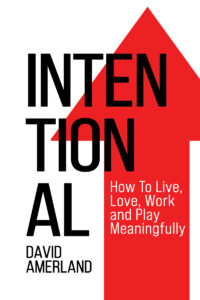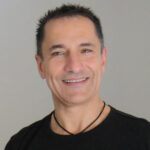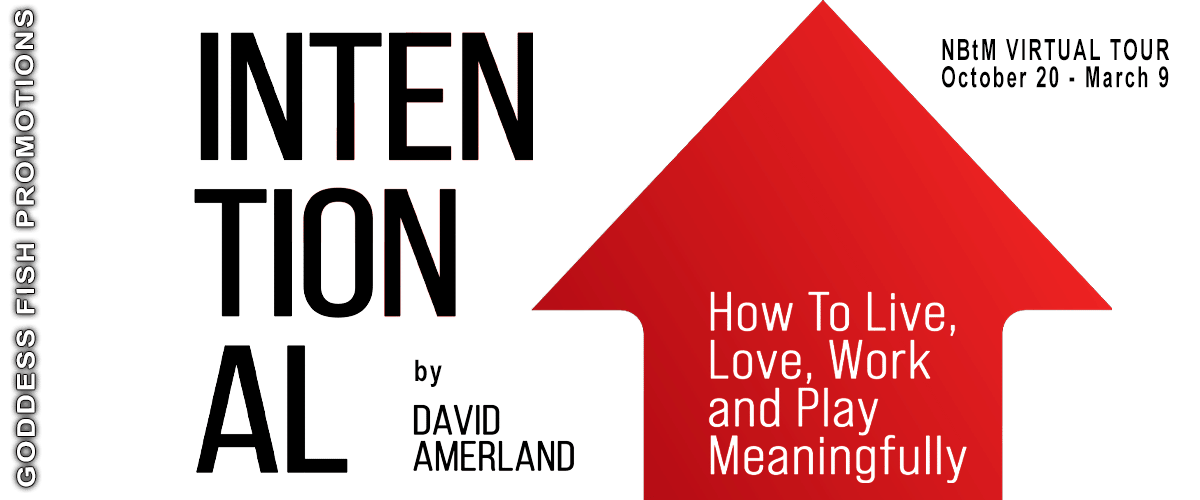 My special guest author today is David Amerland and we’re chatting about his new self-help book, Intentional: How to Live, Love, Work and Play Meaningfully.
My special guest author today is David Amerland and we’re chatting about his new self-help book, Intentional: How to Live, Love, Work and Play Meaningfully.
During his virtual book tour, David will be awarding a $25 Amazon or Barnes and Noble (winner’s choice) gift card to a lucky randomly drawn winner. To be entered for a chance to win, use the form below. To increase your chances of winning, feel free to visit his other tour stops and enter there, too!
Bio:
David Amerland is a Chemical Engineer with an MSc. in quantum dynamics in laminar flow processes. He converted his knowledge of science and understanding of mathematics into a business writing career that’s helped him demystify, for his readers, the complexity of subjects such as search engine optimization (SEO), search marketing, social media, decision-making, communication and personal development. The diversity of the subjects is held together by the underlying fundamental of human behavior and the way this is expressed online and offline. Intentional: How to Live, Love, Work and Play Meaningfully is the latest addition to a thread that explores what to do in order to thrive. A lifelong martial arts practitioner, David Amerland is found punching and kicking sparring dummies and punch bags when he’s not behind his keyboard.
Welcome, David. Please tell us about your current release.
Intentional: How to Live, Love, Work and Play Meaningfully is a three-year-long deep dive into the worlds of cognitive neuroscience, social psychology and social anthropology with some additional help from the worlds of chemistry and physics. Despite its high-level research-based pedigree it is a down-to-Earth, accessible book written in a very conversational style that is intended to help us understand how to behave better in the many circumstances we encounter in our daily life.
To suggest that we don’t know how to behave appears to be counter-intuitive. After all, we are all adults and we have all graduated in some form from the so-called “school of life”. Yet, as the pandemic made painfully clear to all of us, much of the behavior we call ours actually comes from outside ourselves. It is behavior that is elicited as a result of social conditioning, familial expectations, social interactions and the perceived norms that exist and which we are aware of.
This begs the question: Where does the outside world end and where do we begin? Well, answering that question is that Intentional is there to do.
What inspired you to write this book?
Intentional is the result of another deep dive into the worlds of mathematic, physics, neuroscience, social psychology and cognitive psychology which led to my previous book: The Sniper Mind – Eliminate Fear, Deal With Uncertainty and Make Better Decisions. That book led me down a great many rabbit holes and some of those became the seed that led to Intentional: How to Live, Love Work and Play Meaningfully. The subtitle of Intentional is important. We all need meaning in our life in order to have a sense of its value. We all need to feel that we matter. That what we do matters. The moment something matters to us its perceived value to us also changes. This leads to a context-driven, relational evaluation of everything that drives us: the things that fire us up, the ideas we love or hate, the values we espouse, the beliefs we hold, the decisions we make and the actions we take.
If we can better understand the things that trigger us and how to control them and the things that are important to us and how to prioritize them we can lead better, focused and more productive lives and we can be happier in who we are and what we achieve.
Excerpt from Intentional: How to Live, Love, Work and Play Meaningfully:
If you’re reading this and you’re young then you already know the feeling inside you that wants you to become a rebel. It doesn’t matter what it is that you want to rebel against or fight for. You just want to fight. If you’ve been young (and we can all claim that) then you are already familiar with that feeling and the nagging remnants it leaves behind that make you, on occasion, behave in ways that your critics call “out of character”.
The idea that someone other than yourself has a better grasp on what your character is and can then judge your behavior as being in tune with it or not is ludicrous at best, delusional at worst. Yet this is exactly what people will do, not realizing that what they are actually judging is not your behavior according to your character but your behavior according to what they want your character to be. And the reason they want you to be in the character they ascribe to you is because it makes life easier for them.
By accepting what they give you and behaving accordingly you reinforce their own value judgements and life choices. You validate their beliefs. You live according to their expectations. You, in short, then are not “you” who thinks and acts but the “you” they want whose thoughts and actions fit a pre-moulded idea that generates the least amount of trouble for the greater group you belong to. Live like that and you will find that your life will evolve into a series of steps, actions and calculations designed to keep you contained within the “least troublesome” subset of society, generally labelled as “respectable”.
“Respectable” comes with assigned, pre-determined and carefully bounded social status. That social status is automatically given to you alongside the perception of a pre-assigned social value. Accept both of these and you only need to put up with whatever personal unease you feel about your life choices, until you die. At which point the people and circumstance that ascribed all this to you, and you who chose to unquestioningly accept it, no longer matter.
This way each generation tries to forge its own way but only truly ends up re-asserting the status quo. We each become our parents because we become parents in turn. We end up shoring up the creaking structures of our societies because we set up our own edifice of personal value upon them which then makes us have a vested interest in their stability.
Just like Flat Earthers cannot prove their proposition, no matter how hard they try, using the existing science that has already proved the Earth is round, so we cannot hope to truly change our life if we only use the values, roles and attributes that are ascribed to us by those around them.
What exciting story are you working on next?
Typically, as an experienced author, I work on several ideas at a time. I am working on three now, as it happens, doing preliminary research, putting together skeleton outlines that will need to be fleshed out and doing all the market research and establishing what competing titles are out there and how they did.
I can’t yet say which of the three ideas will become my next-book reality but what I can promise, even at this stage, is that it will be epic.
 When did you first consider yourself a writer?
When did you first consider yourself a writer?
Writers, sometimes struggle to see themselves as writers because A. Everyone thinks they can write and B. There are still people around us that don’t consider writing to be a serious job. Nevertheless it is important even for new, unpublished writers to feel that they are, actually, writers. In Intentional there is a segment where I give neuroscientific evidence that shows that we become what we believe ourselves to be. There are distinct, visible and evidential neurobiological and neurochemical changes that take place in the brain the moment we actually believe in something. This is the reason why, authoritarian regimes, for instance, are so afraid of ideas and why governments and societies have always tried their best to harness and control the belief system of the people within their authority.
I was fortunate enough as a child to be surrounded by books. To have books read to me when I was very young and to have access to books of all types, without any kind of parental control, from the moment I could read. As a result I developed the kind of thinking that lends itself, naturally, to writing. I have always felt I was a writer, even when my longest work was a school essay.
Do you write full-time? If so, what’s your work day like? If not, what do you do other than write and how do you find time to write?
I am that relatively rare breed of author who is a full-time writer. Everything else I do, keynote speeches, consulting, analysis and planning are side-gigs to my writing. In 2019 I clocked up 55,000 air miles crisscrossing the globe giving talks to CEOs and corporate VIPs. The pandemic made me realize how intensely I miss my partner and our dogs when I am travelling so I’ve decided to give up the travel gig and focus even more on my writing, increasing my blogging and vlogging.
My usual day starts with an hour to ninety minutes of exercise which I need to maintain my focus throughout the day. I then have breakfast, walk my dog and start the day by replying to emails and social media questions.
By the time I finish it is probably midday and I already, by then, have a couple of ideas from all this interaction that will become blog posts. If I am not working on a book I tend to publish three-four blog posts a week, a video or two and write about three articles for the various publications I work for or who ask for specific material from me.
Then it’s time to break for lunch and I will spend sometime on my Playstation playing either Uncharted or Call of Duty. I use this time to think as ideas percolate in my brain so, while I am a moderately good player, my team, on these occasions ends up cursing me as my attention is only nominally on the game on the screen.
I finish the evening by going through research material, making notes, scheduling interviews or answering interview questions. I finish the day with another exercise session about an hour long. When I am working on a book all other writing stops so I follow more or less the same routine with the exception that everything else revolves around research and writing. I edit my own writing only after the manuscript is finished but I keep detailed notes of passages or chapters where I know that what I wrote needs either simplification or a complete re-write.
What would you say is your interesting writing quirk?
When I write I keep a diary of notes on each chapter, noting where I need to do better or write a little more. In reviewing these notes, afterwards, I always find sections where I have written “You can do this” and “You will totally finish this book”. They’re a sort of pep talk to myself and the funny thing is that the relief of having finally finished a book is such that by the time I’m done I have completely forgotten those patches where I was struggling so badly I needed to write these small notes of support to myself. They always surprise me afterwards.
As a child, what did you want to be when you grew up?
Well, I wanted to be a superhero. I waited for that to happen almost up to the point where waiting for a radioactive spider to bite you or benevolent aliens to grant you a ring of power was embarrassing. I didn’t live near any radioactive swamps so my thoughts turned naturally to writing. And because, at the time, writing was not a respectable profession, especially within my family, I set my sites on Chemical Engineering.
Anything additional you want to share with the readers?
Our world is changing fast Intuitively we all sense this. What we don’t quite know is what it is that is changing and how it will affect us. Regardless of the context in which we experience change and irrespective of what we want to do or how affected we are by this perceived change we all face the same challenge now: how can we make our life matter? How can we be happy with our choices and our actions? Intentional is key to answering these questions.
Links:
Website | Twitter | Instagram | LinkedIn

